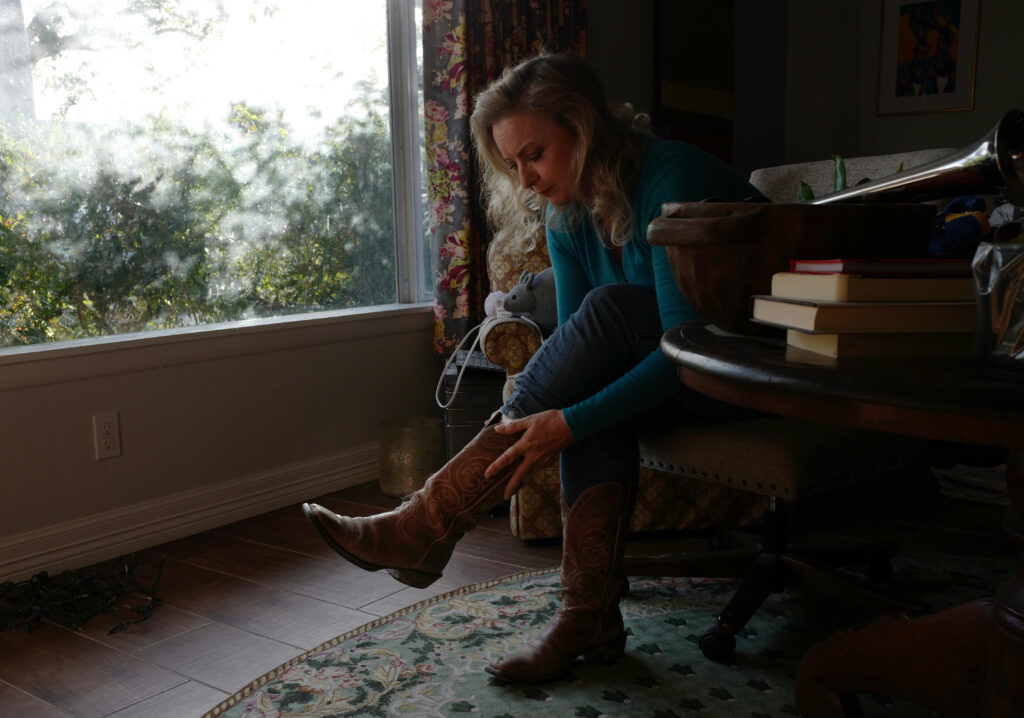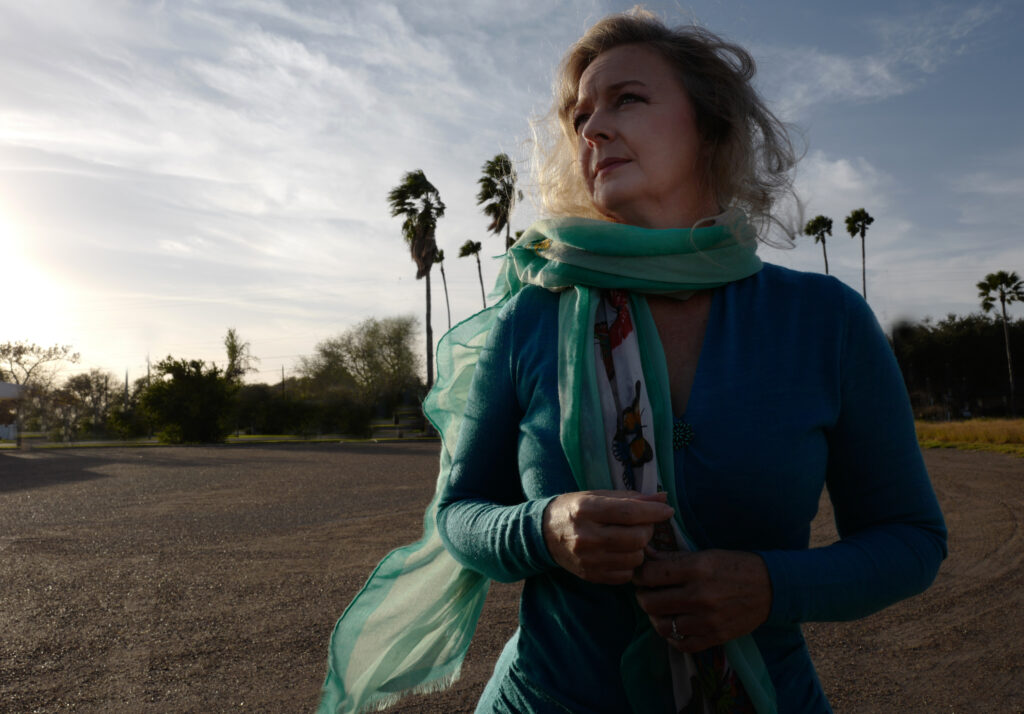
She didn’t go looking for a fight; it came to her.
The fight came to Marianna Treviño Wright in November 2019 after Brian Kolfage — an Iraq War veteran and staunch supporter of then-President Donald Trump — accused the National Butterfly Center’s executive director of human and drug trafficking.
“What’s not funny @NatButterflies is how you decline to comment on the rampant sex trade taking place on your property and the death (sic) bodies? Any comment?” Kolfage tweeted on Nov. 16, 2019.
The 30-odd tweets came just days before the center and Treviño Wright filed suit against Kolfage, his fundraising nonprofit, We Build the Wall, and the construction firm — Fisher Sand and Gravel — that was then gearing up to erect a private border wall east of the center’s 100-acre preserve.
The tweets are no longer accessible because Twitter has since suspended Kolfage’s account, but at the time, his barrage of accusations had alarming personal repercussions for Treviño Wright.
“Almost all of it was physically threatening. It was misogynistic, rape-based attacks directed at me and at my children. Someone even said I should be hung and set on fire,” Treviño Wright said, recalling the harassment she began receiving.
At the time, Kolfage was in the middle of using We Build the Wall to raise funds for private border wall construction. His nonprofit had already provided millions to South Dakota construction magnate Tommy Fisher for a half-mile proof of concept in Sunland Park, New Mexico.
By late 2019, Fisher had his eyes set on Texas — to a sugarcane farm just south of Mission owned by Lance Neuhaus and his family.
The butterfly center often leads birdwatchers on boat tours on that stretch of river. Federal agents patrol the river, too. And one can occasionally see signs of migrants having passed through, but for the most part, that stretch of river is peaceful.
Prior to the pandemic, the center would even host outdoor sleepovers for Girl Scouts and other organizations.
Given its proximity to the border, however, the center — like other riverside landowners — eventually found itself facing the prospect of losing land to federal border wall construction.

TARGETED CAMPAIGN
In the summer of 2017, Treviño Wright discovered government contractors on the center’s property clearing trees and brush when they had not obtained permission to do so.
Treviño Wright exposed the trespassing, and thus began the center’s first foray into litigation. It sued the Department of Homeland Security in relation to the matter. That lawsuit remains ongoing in Washington D.C. federal court five years later.
Treviño Wright thinks it’s that lawsuit that brought the butterfly center to the attention of Kolfage and Fisher as they considered their next private wall project.
We Build the Wall could leverage the national attention the lawsuit had gained as Kolfage pressed his conservative following to donate ever more money to the cause.
“We would become basically their piñata. They would string us up and swing at us in order to incite others to give,” Treviño Wright said.
The strategy worked. We Build the Wall collected some $25 million in donations.
Treviño Wright has long claimed that the Neuhaus location was part of a targeted campaign to beef up fundraising, and in turn line the pockets of We Build the Wall’s primary stakeholders, including Kolfage and former Trump adviser Steve Bannon.
Her early suspicions appear to have proven true, as Kolfage and two other men currently await trial in New York federal court on charges that they defrauded donors.
Bannon, who was also charged, subsequently received a pardon from Trump.
As for Tommy Fisher, he has since secured just over $2 billion in federal wall contracts.
But Kolfage and Fisher may have underestimated just how much of a fight Treviño Wright would put up when they chose her to be their foil.
THREATS AND MORE
When the butterfly center filed suit against the lot of them in December 2019, Kolfage bragged about having “snipers in the bushes around the butterfly center,” Treviño Wright said.
In one instance, a man who later turned out to be a Central Texas police officer made repeated threats via phone and email, unbeknownst to his chief.
Then there were the members of anti-government militias — often associated with white supremacist ideologies — such as the Oath Keepers and the Three Percenters, who began to appear at the center.
The founders of both organizations have publicly disavowed having any associations with white supremacy.
“Mission PD thankfully took all of our reports seriously and shared them with the FBI and they did actually wind up arresting some of the militia men for outstanding warrants,” Treviño Wright said.
The harassment continues to this day, she said.

LEGAL ROADBLOCKS
The lawsuit itself, however, has stagnated since being moved to federal court.
Early on, U.S. District Judge Randy Crane chose to hold hearings in tandem with another suit filed against Fisher by the federal government.
That suit alleges the private wall violates a 1970 international boundary treaty with Mexico.
Treviño Wright and her attorney, Javier Peña, have since endured a series of roadblocks in the advancement of their suit — from defendants not having attorneys, to the COVID-19 pandemic, to the judge himself failing to rule on whether he has jurisdiction to hear the case.
Crane didn’t rule on jurisdiction until just this week. He chose to send the defamation portion of the lawsuit back to state court, while retaining the land rights claims.
Crane did so citing that the center’s claims that the private wall creates a prospective nuisance could result in a judgment that would involve a federal interest — namely, the treaty, which regulates development within the Rio Grande floodplain on both sides of the border.
“Still, NABA’s (North American Butterfly Association) requested relief adds a layer of complexity that invokes a federal question or interest,” Crane said in the 18-page ruling handed down Thursday.
The judge essentially argues that if the butterfly center prevails in its lawsuit, then the “injunctive relief” could extend as far as tearing the wall down. But doing so — changing a development within the floodplain — would require federal regulatory approval.
Treviño Wright argues that that would not have been necessary had Crane not dissolved the temporary restraining order which had paused construction in December 2019.
Treviño Wright has often voiced criticism over many of Crane’s decisions in the intervening two years since the suit was filed. After Friday’s status conference, however, those criticisms became much more pointed.
‘AWFULLY LONELY’
The long court delays and nonstop harassment and threats have taken a toll on the executive director.
After spending her professional life working for nonprofits and medical organizations that benefit women, children and survivors of sexual assault, Treviño Wright said she came to the National Butterfly Center to help it become self-sustaining.
“It was to educate children and the community members about the benefits of the outdoors,” she said.
Asked what it’s like to instead have become the public face of the butterfly center’s fight, Treviño Wright described it as “lonely.”
“The toll this has taken on my health, on my home, on my children and husband… it hasn’t been worth it, I don’t think,” Treviño Wright said, speaking of the deep fatigue that has her rethinking her future at the center.
Peña, who has known Treviño Wright since long before the lawsuit began, has seen how the past couple of years have impacted his client and friend.
“It’s taxing. It’s very taxing when you fight and fight and these people just do corrupt thing after corrupt thing and get away with it. It’s very disheartening,” Peña said.
“She’s got more fight in her than most of us, and the fact that she’s even being ground down, that’s the problem with the system that we’re in that needs to be fixed,” he said.
Despite the fatigue, Treviño Wright has not given up.
Recently, while giving a presentation to a group of college students, they asked her what keeps her going.
“I told them that when I get really, really upset about the whole thing, I think about the courage that it takes people to leave their homes carrying their children or their only precious belongings and flee,” Treviño Wright said, referring to the asylum seekers who come to the Texas-Mexico border.
As she recalled the conversation, her voice hitched with emotion for the first time in the dozens of interviews she has granted The Monitor regarding the lawsuit.
“I just have this bent for justice, for what’s fair, and what’s right, and what’s true,” she said.
EDITOR’S NOTE: This post has been updated to correct an error. Tommy Fisher has since secured just over $2 billion in federal wall contracts.



